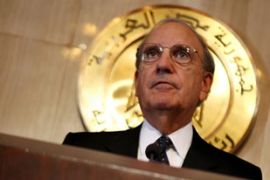Mitchell ends Middle East peace bid
No middle ground found after shuttle diplomacy by US envoy, Palestinians say.

Mitchell’s efforts were effectively brought to an end, at least temporarily, by the onset of Israeli and Palestinian public holidays – the Jewish New Year and Muslim Eid al-Fitr.
‘No agreement’
US and Israeli officials remained tight-lipped over the talks, but Saeb Erekat, the chief Palestinian negotiator, said that no deal had been reached.
| in depth | |||||||||||||||||
|
“Mitchell’s shuttle visit has ended without agreement. There is no agreement yet with the Israeli side and no middle-ground solution,” he said.
Abbas has demanded a full halt to settlement expansion in the West Bank and East Jerusalem as a condition for resuming negotiations on a final peace settlement – talks that were broken off in
December.
Barack Obama, the US president, has endorsed that call, urging both sides to meet the terms of a 2003 US-backed “road map” for peace.
But Netanyahu has ruled out stopping construction in East Jerusalem and wants settlements in the West Bank to be able to grow to accommodate the expanding families of current settlers.
The Reuters news agency quoted an unnamed Israeli government official as saying that Israel was prepared to go further than the six-month freeze previously suggested by Netanyahu.
“Israel will agree to extend the freeze beyond six months – possibly nine months, but less than a year,” the official was reported as saying.
The US has pushed for a year-long freeze in settlement building.
The Palestinians say that the spread of the settlements could deny them a viable state as they divide areas of the West Bank.
About 500,000 Israelis live in the West Bank and in Arab East Jerusalem, territory captured in a 1967 war, alongside about three million Palestinians.
Meeting ‘still possible’
The meeting at the United Nations in New York could still take place, Erekat said, but added that it would be “meaningless” unless Netanyahu changed his position on settlement expansion.
Rowland said: “The Palestinians will obviously be in New York at the United Nations General Assembly, and the Israelis will be there as well.
“So theoretically the two sides would have up until the eleventh hour to actually decide whether they were going to meet, even for a symbolic handshake, with President Obama.”
A further key issue stalling the talks is Israeli reluctance to commit to a target schedule for reaching a final settlement, possibly in no more than two years, that would create a Palestinian state.
Abbas, facing a strong challenge from Hamas, which controls the Gaza Strip, has rejected suggestions that he negotiate possible temporary arrangements with Israel.
Hope for talks
Philip Wilcox, a former US consul in Jerusalem and current president of the Foundation for Middle East Peace think-tank, told Al Jazeera there is still hope for talks.
“I would say that it is the end of the beginning rather than the beginning of the end,” he said.
“The settlement freeze was designed as a confidence building measure, as a preliminary to real negotiations on the issues that really count.
“Freezing settlements would still leave 500,000 settlers in the West Bank and East Jerusalem.
“The real issues are borders, refugees, Jerusalem, the settlements and security.”
